|
 Secure Site
Secure Site
|
 |
Archive for December, 2012
 Sleep to Remember - Utamaro Kitagawa, Dojoji Dancer Just in time for the holidays, some medical advice most people will like: Take a nap.
Interrupting sleep seriously disrupts memory-making, compelling new research suggests. But on the flip side, taking a nap may boost a sophisticated kind of memory that helps us see the big picture and get creative.
“Not only do we need to remember to sleep, but most certainly we sleep to remember,” is how Dr. William Fishbein, a cognitive neuroscientist at the City University of New York, put it at a meeting of the Society for Neuroscience last week.
Good sleep is a casualty of our 24/7 world. Surveys suggest few adults attain the recommended seven to eight hours a night.
Over time, a chronic lack of sleep can erode the body in ways that leave us more vulnerable to heart disease, diabetes and other illnesses.
But perhaps more common than insomnia is fragmented sleep – the easy awakening that comes with aging, or, worse, the sleep apnea that afflicts millions, who quit breathing for 30 seconds or so over and over throughout the night.
Indeed, scientists increasingly are focusing less on sleep duration and more on the quality of sleep, what’s called sleep intensity, in studying how sleep helps the brain process memories so they stick. Particularly important is “slow-wave sleep,” a period of very deep sleep that comes earlier than better-known REM sleep, or dreaming time.
Fishbein suspected a more active role for the slow-wave sleep that can emerge even in a power nap. Maybe our brains keep working during that time to solve problems. He and graduate student Hiuyan Lau devised a simple test: documenting relational memory, where the brain puts together separately learned facts in new ways.
 Sleep to Remember - Choose a Gentle Chime Alarm Clock First, they taught 20 English-speaking college students lists of Chinese words spelled with two characters. Half the students took a nap, being monitored to be sure they didn’t move from slow-wave sleep into the REM stage.
Upon awakening, they took a multiple-choice test of Chinese words they’d never seen before. The nappers did much better at automatically learning that the first of the two-pair characters in the words they’d memorized earlier always meant the same thing – female, for example. So they also were more likely than nonnappers to choose that a new word containing that character meant “princess” and not “ape.”
“The nap group has essentially teased out what’s going on,” Fishbein concludes.
These students took a 90-minute nap, quite a luxury for most adults. But even a 12-minute nap can boost some forms of memory, adds Dr. Robert Stickgold of Harvard Medical School.
Conversely, Wisconsin researchers briefly interrupted nighttime slow-wave sleep by playing a beep – just loudly enough to disturb sleep but not awaken – and found those people couldn’t remember a task they’d learned the day before as well as people whose slow-wave sleep wasn’t disrupted.
That brings us back to fragmented sleep, whether from aging or apnea. It can suppress the birth of brain cells in the hippocampus, where memory-making begins – enough to hinder learning weeks after sleep returns to normal, warns Dr. Dennis McGinty of UCLA.
To prove a lasting effect, McGinty mimicked human sleep apnea in rats. He hooked them to brain monitors and made them sleep on a treadmill. Whenever the monitors detected 30 seconds of sleep, the treadmill briefly switched on. After 12 days of this sleep disturbance, McGinty let the rats sleep peacefully for the next two weeks. The catch-up sleep didn’t help.
adapted from SFGate.com, auran Neergaard, Associated Press
One of the ultimate Zen like experiences is waking-up from a great slumber refreshed and energized. Your mind and body are harmoniously one, both alert and focused. Having a refreshed mind and body are two keys to a natural and Zen lifestyle. Waking up in the morning should not be a loud and abrupt awakening, but rather it should be a peaceful positive experience. The right natural alarm clock can transition your deep and tranquil sleep into a serene start to consciousness. Imagine a long-resonating Tibetan bell-like chime waking you up to a beautiful morning experience.
The right alarm clock can be the most beneficial investment for you. With our Now & Zen natural alarm clock you are awakened more gradually and thus more naturally. Now & Zen is focused on creating a naturalistic lifestyle, and our clocks are an example of our philosophy.
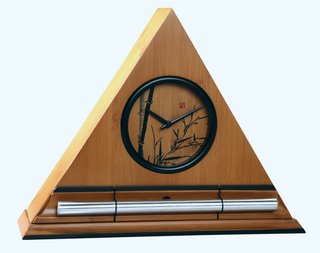 Wake up with gradual, beautiful acoustic chimes. The Zen Alarm Clock transforms your mornings and gets you started right, with a progressive awakening Now & Zen – The Zen Alarm Clock Store
1638 Pearl Street
Boulder, CO 80302
(800) 779-6383
Posted in Bamboo Chime Clocks
 Choose a Gentle Chime Alarm Clock - Eisen Keisai, Woman Getting out of a Mosquito Net When his clock-radio goes off at 7 a.m., David Epstein’s latest wake- up strategy roars into high gear: He stumbles out of bed, walks across the room and pushes the snooze button. Then he climbs back between the sheets.
A few minutes later, his travel clock rings. He presses snooze and rolls over for more sleep — until the alarm on his BlackBerry goes off. Sitting up, he punches keys to reset it for 10 more minutes; then it’s back to the pillow.
The pattern repeats amid a cacophony of assorted rings until his real wake-up time, 8 a.m.
In a nation that clocks around six to seven hours of sleep a night when an average of eight hours is recommended, it is a rare person who wakes up without an alarm. And because it is usually a struggle, pushing “snooze” to delay the day has become as much a part of the wake-up ritual as a cup of coffee.
But is a bumpy arousal for 30, 60 or even 90 minutes a way to recoup much- needed sleep? Or is it a recipe for exhaustion?
Although scientists have not specifically tackled the question, sleep researchers agree that short bouts of sleep are far from ideal. The restorative value of rest is diminished, especially when the increments are short, said Dr. Edward Stepanski, who has studied sleep fragmentation at the Rush University Medical Center in Chicago. And a teeter-totter effect of dozing and waking causes shifts in the brain-wave patterns.
“Even a subtle noise that doesn’t actually wake you up is disruptive enough to affect the sleep quality,” Stepanski said. “That’s why someone who falls asleep with the TV on may wake up exhausted. So, if a person is rousing themselves enough to reset a clock, there’s likely to be an even more profound effect.”
 Banish the Snooze Button -- Choose a Gentle Chime Alarm Clock It is an axiom of sleep research that not all sleep is equal. A night’s sleep is divided into five continually shifting stages, defined by types of brain waves that reflect either lighter or deeper sleep. Toward morning, there is an increase in rapid eye movement, or REM sleep, when the muscles are relaxed and dreaming occurs, and recent memories may be consolidated in the brain. Sleep-deprived snooze-button addicts are likely to cut short their quota of REM sleep, impairing their mental functioning during the day.
How tired a person is when the snooze-button frenzy begins is important, experts say. Someone who got a full eight hours of sleep may push the snooze button, but won’t nod off again very easily, Stepanski said. And some people seem to be more tolerant of short-term sleep loss.
But the person who has been getting too little sleep for too long may be a wreck, especially by Friday after racking up a large sleep debt during the week.
To complicate matters, feeling alert is not just a matter of getting the right dose of different kinds of sleep. The body has its own alarm clock, a circadian rhythm in which fluctuations in hormones like cortisol, melatonin, ghrelin and growth hormone regulate sleepiness and alertness, as well as other body functions.
And sleep patterns can run on a schedule different from a person’s body clock. Trying to sneak in more sleep when someone is used to getting up early can cause the body to switch to an alert mode, making any extra sleep light and fragmented, said Dr. Timothy Roehrs, the director of research at the Sleep Disorders and Research Center at Henry Ford Hospital in Detroit.
On the other hand, if someone’s body is on a later cycle from habitually staying up late, waking up early is that much harder because the body is not yet pumping out peak levels of cortisol and other hormones that help wake people up.
Still, most hard-working people cope, managing to live in what researchers agree is a perpetual sleep-deprived state.
They mask fatigue by keeping themselves alert with a variety of stimuli, like caffeine, exercise or simply keeping busy. Some people with sleep debts do not consider themselves tired, believing that they are functioning normally, said Dr. David Dinges, chief of the sleep and chronobiology division at the University of Pennsylvania School of Medicine.
But evidence is mounting on the behavioral risks of long-term partial sleep deprivation. Not getting enough sleep day after day takes its toll. And it is not only medical interns and truck drivers doing double shifts who can suffer from serious mistakes at work because of it.
In the August issue of the journal Sleep, Roehrs published one of the first studies to measure the effect of sleepiness on decision making and risk taking.
Roehrs and his colleagues paid sleepy and fully alert subjects to complete a series of computer tasks. At random times, they were given a choice to take their money and stop. Or they could forge ahead with the potential of either earning more money or losing it all if their work was not completed within an unknown remainder of time.
“The alert people were very sensitive to the amount of work necessary to finish and the risk of losing their money if they didn’t,” Roehrs said. “The more work they had, the more apt they were to stop. Without fail, the sleepy people chose to quit when it was optimal to continue, and they gambled losing it all by trying to finish the task for more money even when it was 100 percent likely that they would be unable to finish.”
Numerous studies have documented sleep impairments on memory, reaction time, comprehension and attention. Even emotional states can be affected. One of the first signs of sleep debt is irritability and increased depression, said Dr. Arthur Spielman, a professor of psychology and sleep researcher at City College of New York.
So what is a sleepy person to do? Start paying back sleep debt, for starters, experts say. Turn off David Letterman and get to bed half an hour earlier. Night owls who do not feel sleepy should cut off the stimulation: turn off the lights and television and lie in bed with closed eyes for one minute to unmask their sleepiness, Spielman recommended.
He added that those who still found it hard to get to sleep early at night should wake up early and experience morning light to reset the body clock.
After a couple of weeks, they will feel more tired in the evening and go to sleep earlier, making it easier to get up the next day, he added.
And come morning, setting the clock for only 10 minutes earlier than the optimal wake-up time, allowing for only a single opportunity to press the snooze button, will provide the most restorative period of solid sleep.
Of course, waking at the last possible minute requires a leap of faith.
“I’m not convinced that this would work, because I don’t trust myself to get up,” Epstein admitted. “Besides, I like to ease myself out of bed. When that alarm rings, I would sell my soul for an extra 15 minutes of sleep.
“So, by setting my clocks an hour earlier, I get to wake up and know that I can go back to bed. It feels really good.”
Have no fear – there is an Alternative to the Snooze Button — Choose the built-in Snooze – a Gradual, Soothing Chime Alarm Clock
Now & Zen ® creates natural lifestyle products that make a real difference in people’s lives. The growing preference for natural foods and natural fibers is carried forward by Now & Zen® in the natural acoustic sounds and natural hardwood materials featured in every Now & Zen® product. With a selection of different styles, these unique alarm clocks wake you gradually and naturally. A series of acoustic bell-like chimes transforms your daily arrival into a tranquil beginning. Each timepiece combines beauty and versatility. These are high quality products that are not only modern and luxurious but are also peaceful and add to a stress-free day in an already stress filled world.
adapted from SFgate.com, by Martica Heaner, New York Times
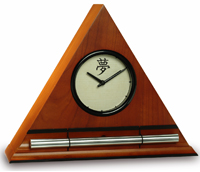 Gradual Chime Alarm Clock with Soothing Sounds Now & Zen – The Zen Alarm Clock Store
1638 Pearl Street
Boulder, CO 80302
(800) 779-6383
Posted in Uncategorized
 Utamaro Ukiyo-e, Two Ladies With Flowers The “Floating World” described the urban lifestyle, especially the pleasure-seeking aspects, of the Edo-period Japan (1600 –1867).
The term is also an ironic allusion to the homophone (the same as another word but differs in meaning) “Sorrowful World”, the earthly plane of death and rebirth from which Buddhists sought release.
The contemporary novelist Asai Ryoi, in his Ukiyo monogatari (“Tales of the Floating World”, c. 1661), provides some insight into the concept of the floating world:
… Living only for the moment, turning our full attention to the pleasures of the moon, the snow, the cherry blossoms and the maple leaves; singing songs, drinking wine, diverting ourselves in just floating, floating; … refusing to be disheartened, like a gourd floating along with the river current: this is what we call the floating world…
Ukiyo floating world adapted from wikipedia.org
One of the ultimate Zen like experiences is waking-up from a great slumber refreshed and energized. Your mind and body are harmoniously one, both alert and focused. Having a refreshed mind and body are two keys to a natural and Zen lifestyle. Waking up in the morning should not be a loud and abrupt awakening, but rather it should be a peaceful positive experience. The right natural alarm clock can transition your deep and tranquil sleep into a serene start to consciousness. Imagine a long-resonating Tibetan bell-like chime waking you up to a beautiful morning experience.
The right alarm clock can be the most beneficial investment for you. With our Now & Zen natural alarm clock you are awakened more gradually and thus more naturally. Now & Zen is focused on creating a naturalistic lifestyle, and our clocks are an example of our philosophy.
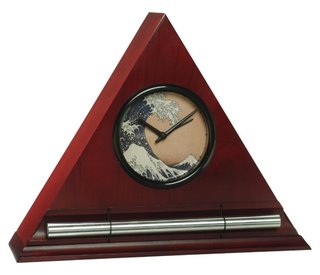 Meditation Clock Timer- Zen Alarm Clock, Ukiyo-e Hokusai Wave Dial Face Now & Zen – The Zen Alarm Clock Store
1638 Pearl St.
Boulder, CO 80302
(800) 779-6383
Posted in Beauty, Cherry Blossoms, Chime Alarm Clocks, Hokusai Wave, Japanese Inspired Zen Clocks, Meditation Timers, Meditation Tools, Now & Zen Alarm Clocks, Progressive Awakening, Zen Timers
 koi fishes in the pond Koi or more specifically nishikigoi, (literally “brocaded carp”), are ornamental domesticated varieties of the common carp (Cyprinus carpio) that are kept for decorative purposes in outdoor ponds and water gardens. They are also called Japanese carp.
adapted from wikipedia.org
One of the ultimate Zen like experiences is waking-up from a great slumber refreshed and energized. Your mind and body are harmoniously one, both alert and focused. Having a refreshed mind and body are two keys to a natural and Zen lifestyle. Waking up in the morning should not be a loud and abrupt awakening, but rather it should be a peaceful positive experience. The right natural alarm clock can transition your deep and tranquil sleep into a serene start to consciousness. Imagine a long-resonating Tibetan bell-like chime waking you up to a beautiful morning experience.
The right alarm clock can be the most beneficial investment for you. With our Now & Zen natural alarm clock you are awakened more gradually and thus more naturally. Now & Zen is focused on creating a naturalistic lifestyle, and our clocks are an example of our philosophy.
 mindful of the koi
Now & Zen – The Zen Alarm Clock Store
1638 Pearl Street
Boulder, CO 80302
(800) 779-6383
Posted in Chime Alarm Clocks, Now & Zen Alarm Clocks, Progressive Awakening, Zen Timers
 why we need the sun The sun is the center of our lives. It gives us day and night, seasons, light, heat, colors, wind, plant life, moonlight and a sense of direction and time of day—not to mention awesome sunrises and sunsets. Solar heating, daylighting, and solar electricity reduce our dependence on nonrenewable energy sources. And the absence of sunshine can be debilitating, as any sufferer of Seasonal Affective Disorder (SAD) can attest. Yet sunlight can degrade fabrics, overheat our homes, encourage cataracts, and cause our skin to age and develop cancer. We are urged to go outside only under cover of hats, sunglasses, sunscreens, and tightly woven fabrics. What we rarely hear is that sunshine is also an important element of good health.
Why we need sunlight
According to Zane Kime, M.D., M.S., in Sunlight (World Health Publications, 1980), the ultraviolet (UV) portion of sunlight helps our heart, blood chemistry, immune system, energy level, and sex life, while its absence weakens our body’s systems and contributes to disease. Furthermore, we rely on the sun’s daily and annual cycles to regulate such bodily functions as heart rate, blood pressure, hormone levels, metabolism, and immunity. When modern living throws our biological rhythms out of synch with solar rhythms, the results can be fatigue, depression, insomnia, digestive problems, poor coordination, loss of mental ability, and loss of sex drive and fertility.
Sunlight also improves our attitudes and behavior. Studies have shown that students in daylit schoolrooms performed markedly better than their non-daylit peers. Daylit retail stores experienced increased sales, less absenteeism among employees, and fewer employee mistakes. One survey of indoor workers, from warehouse employees to upper management, found a strong correlation between job satisfaction and the amount of sunlight entering the workspace. There’s even a link between sunny mornings and positive stock market returns.
In addition to its health effects, we can all benefit from developing a richer relationship with the sun. Do you awaken gradually in the mornings with sunlight, or does an alarm clock interrupt your sleep cycles? Does sunshine enter the rooms where you spend your days? Do you get outdoors with some skin exposed every day? Do you notice that the color of the sun’s light is different in the morning, noon, and evening—different in summer and winter? Do you notice the sun’s path being higher in summer than in winter? Do you watch the sun rise or set?
If your life is less than sun-kissed, here are some suggestions. Learn to identify the compass directions, and observe the sun’s path across the sky regularly. Notice where sunlight falls at various times of day in your home, yard, and workplace. As appropriate, move furniture to bring your activities closer to daylight. Create a sculpture or sundial that makes the sun’s motion visible. Grow plants. Rise with the sun and slow down after sunset. Move some activities outdoors. Cultivate a life within walking distance of home. Listen to your body and mind to create your own right relationship with the sun.
CAROL VENOLIA is an architect, author of Healing Environments: Your Guide to Indoor Well-Being.
adapted from Natural Home Magazine, July/August 2002
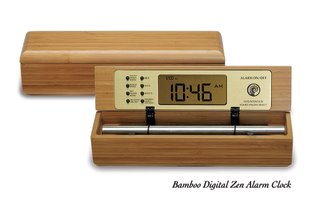 Portable Meditation Timer and Yoga Clock Use our unique “Zen Clock” which functions as a Yoga & Meditation Timer. It features a long-resonating acoustic chime that brings your meditation or yoga session to a gradual close, preserving the environment of stillness while also acting as an effective time signal. Our Yoga Timer & Clock can be programmed to chime at the end of the meditation or yoga session or periodically throughout the session as a kind of sonic yantra. The beauty and functionality of the Zen Clock/Timer makes it a meditation tool that can actually help you “make time” for meditation in your life. Bring yourself back to balance.
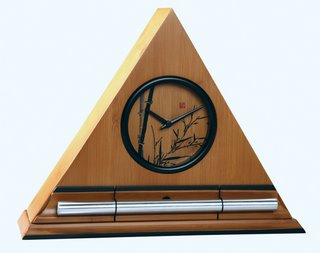 alarm clocks with chime for a gentle awakening
Now & Zen – The Zen Timer & Alarm Clock Store
1638 Pearl Street
Boulder, CO 80302
(800) 779-6383
Posted in Well-being
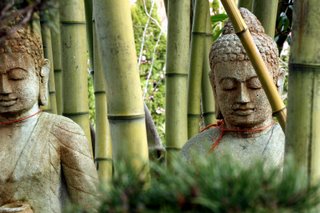 creating sacred spaces Meditation and other spiritual practices are basic to enhancing energy—they create balance and improve the quality of your home or office. In fact, the best thing you can do to create a sacred santuary (to improve the supportiveness of a space) is to do spiritual practices (sadhana). Prayer, meditation, yoga, chanting, and pranayama all enliven a space.
Be consistent with the spiritual practices of whatever tradition you are drawn to. As the Sufi poet Rumi said, your true home is within and reachable by letting go and allowing the mind to go inward. When we feel at home within ourselves and within our own hearts, any building we live in will feel more serene and supportive. Meditation practices make us more perceptive of our environment, so that we intuitively know many of the changes to make. We become more in touch, literally and metaphorically. According to Vastu, the northeast or the center of the home is the best area for meditation rooms, spiritual altars, and yogic practices.
adapted from Yoga Internation by Sherri Silverman
Use our unique “Zen Clock” which functions as a Yoga & Meditation Timer. It features a long-resonating acoustic chime that brings your meditation or yoga session to a gradual close, preserving the environment of stillness while also acting as an effective time signal. Our Yoga Timer & Clock can be programmed to chime at the end of the meditation or yoga session or periodically throughout the session as a kind of sonic yantra. The beauty and functionality of the Zen Clock/Timer makes it a meditation tool that can actually help you “make time” for meditation in your life. Bring yourself back to balance.
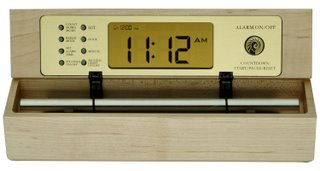 tools for meditation, zen timer Now & Zen – The Yoga Timer & Clock Store
1638 Pearl Street
Boulder, CO 80302
(800) 779-6383
Posted in Feng Shui, Meditation Timers, Meditation Tools, mindfulness practice, Well-being
 acoutic music The theme of spiritual life as a kind of awakening is a metaphor found in every culture and tradition. You might enjoy listening to music by the great German composer Johann Sebastian Bach, who chose the theme of awakening for a cantata he composed in 1731. Inspired by the Gospel of Matthew 25:1–13, it opens with the words, “Wachet auf, ruft uns die Stimme” (Sleepers awake! The Voice calls to us).
adapted from Yoga International, by Rolf Sovik, PsyD, The author of Moving Inward: The Journey to Meditation.
Boulder, Colorado—an innovative company has taken one of life’s most unpleasant experiences (being startled awake by your alarm clock early Monday morning), and transformed it into something to actually look forward to. “The Zen Alarm Clock,” uses soothing acoustic chimes that awaken users gently and gradually, making waking up a real pleasure. Rather than an artificial recorded sound played through a speaker, the Zen Clock features an alloy chime bar similar to a wind chime.
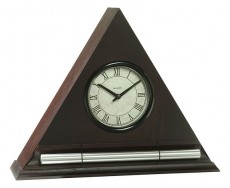 acoutic musical alarm clocks with chime Now & Zen – The Zen Alarm Clock Store
1638 Pearl Street
Boulder, CO 80302
(800) 779-6383
Posted in Zen Timers
 Guided Meditation Practice limitless awareness and let yourself be as infinite as the heavens.
This is the third guided meditation in a series that started two days ago:
Turn your attention from the surface of the lake toward the sky itself. Then imagine shifting your gaze from the reflections, the passing phenomena, to the sky within which they all arise and pass away. The sky is boundless, limitless. It contains everything that arises. The horizon is only a perceptual or conceptual boundary that can never be reached. Even on the cloudiest day, the sky is luminous above the clouds, pervasive, limitless, and free.
Awareness has the qualities of luminosity and limitlessness. It is present always, behind, between, and beyond all the ever-changing phenomena. Whenever you catch yourself identifying with the mental “clouds,” simply shift your identification from the clouds to the sky itself. Realize that what you’ve been seeking is what you already are and have always been! Big Sky Mind opens us to seeing that our true nature is this awareness within which all experience arises and passes away.
adapted from Yoga Journal by Frank Jude Boccio
Although meditation can be done in almost any context, practitioners usually employ a quiet, tranquil space, a meditation cushion or bench, and some kind of timing device to time the meditation session. Ideally, the more these accoutrements can be integrated the better. Thus, it is conducive to a satisfying meditation practice to have a timer or clock that is tranquil and beautiful. Using a kitchen timer or beeper watch is less than ideal.
And it was with these considerations in mind that we designed our digital Zen Alarm Clock and practice timer. This unique “Zen Clock” features a long-resonating acoustic chime that brings the meditation session to a gradual close, preserving the environment of stillness while also acting as an effective time signal.
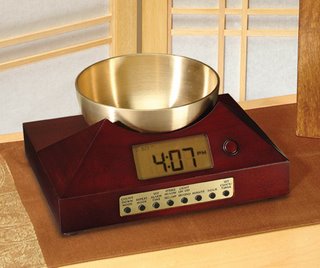 Meditation Timer with Tibetan Bowl Now & Zen – The Meditation Timer Store
1638 Pearl Street
Boulder, CO 80302
(800) 779-6383
Posted in yoga, Yoga Timer, Yoga Timers by Now & Zen
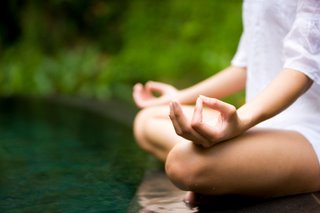 Finding balance is one of life’s great goals, but it can be as elusive as it is desirable. Change your approach and its true nature will emerge. Finding balance is one of life’s great goals, but it can be as elusive as it is desirable. Change your approach and its true nature will emerge.
When you’re balanced, you can feel it. You get the sense that your life is moving along steadily. You take things in stride. You feel healthy and vibrant, challenged by your life, but relaxed enough to enjoy it; protected by the familiar, but excited by the possibilities ahead. So why does achieving it — and maintaining it — seem so difficult to do for so many of us?
Study balance a little closer, and you realize that what many of us perceive to be the ideal balance is in fact not balance at all. Unlike, say, a balanced scale, a balanced life is not symmetrical, still, or neutral. Like riding a bike, living a balanced life comes easier to you as you gain momentum. From that perspective, the myths and truths that follow in each day’s blog can help you find a new understanding of balance — and, finally, a way to get there yourself.
adapted from Body + Soul
Although meditation can be done in almost any context, practitioners usually employ a quiet, tranquil space, a meditation cushion or bench, and some kind of timing device to time the meditation session. Ideally, the more these accoutrements can be integrated the better. Thus, it is conducive to a satisfying meditation practice to have a timer or clock that is tranquil and beautiful. Using a kitchen timer or beeper watch is less than ideal.
And it was with these considerations in mind that we designed our digital Zen Alarm Clock and practice timer. This unique “Zen Clock” features a long-resonating acoustic chime that brings the meditation session to a gradual close, preserving the environment of stillness while also acting as an effective time signal.
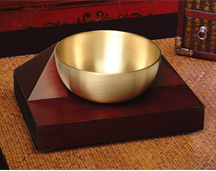 Singing Bowl Meditation Timer
Our Zen Timepiece’s acoustic 6-inch brass bowl-gong clock is the world’s ultimate alarm clock, practice timer, and “mindfulness bell.”
Our Zen Timepiece’s acoustic 6-inch brass bowl-gong clock is the world’s ultimate alarm clock, practice timer, and “mindfulness bell.”
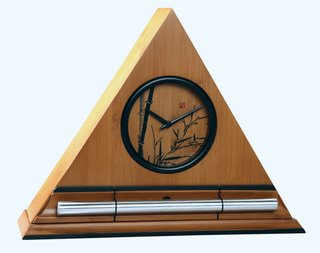 Zen Alarm Clock with Gentle Wake Up Chime Now & Zen
The Singing Bowl Meditation Timer Store
1638 Pearl Street
Boulder, CO 80302
(800) 779-6383
Posted in Bamboo Chime Clocks
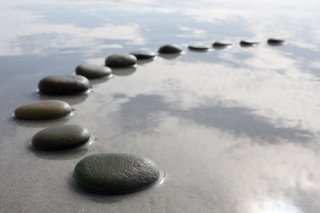 finding balance Myth: Balance is effortless.
Truth: Balance is efficient.
In physics, equilibrium is a state in which all external forces cancel each other out, with no one force exerting dominance over the other. That’s how balance can work, too; it’s not that you’re not exerting any effort, it’s that you’re providing just the right amount for each need.
When you’re balanced, your exertion is distributed so well — your big muscles doing the big work and your little muscles carrying a lighter load — it feels effortless even though it’s anything but. One way to tune in to your balance is to appreciate your physical balance, whether through running, walking, or doing yoga or any activity that calls for focus.
adapted from Body + Soul
Although meditation can be done in almost any context, practitioners usually employ a quiet, tranquil space, a meditation cushion or bench, and some kind of timing device to time the meditation session. Ideally, the more these accoutrements can be integrated the better. Thus, it is conducive to a satisfying meditation practice to have a timer or clock that is tranquil and beautiful. Using a kitchen timer or beeper watch is less than ideal.
And it was with these considerations in mind that we designed our digital Zen Alarm Clock and practice timer. This unique “Zen Clock” features a long-resonating acoustic chime that brings the meditation session to a gradual close, preserving the environment of stillness while also acting as an effective time signal.
 timers for finding balance in your life
Now & Zen – The Chime Meditation Timer Store
1638 Pearl Street
Boulder, CO 80302
(800) 779-6383
Posted in Meditation Timers, Meditation Tools, mindfulness practice, Well-being
« Previous Page — « Previous Entries
Next Entries » — Next Page »
|
|
|
|